Happy Friday. Pray for Ukraine. 🇺🇦
Quick Hits: Today’s Top Stories
Ukrainian President Volodymyr Zelensky said early Friday morning the government confirmed at least 137 Ukrainian soldiers and civilians were killed in the first day of fighting, and another 316 were wounded. He said he believes Russian forces view him as “the number one target,” but promised in an address to the country he will remain in Kyiv.
President Joe Biden announced a second tranche of sanctions aimed at Russia yesterday, targeting five more of Russia’s largest banks, 10 additional Russian oligarchs, two dozen Belarusian individuals and entities, and export controls on sensitive technologies and softwares. The administration stopped short of cutting Russia out of the SWIFT financial system and targeting Putin himself with sanctions, but Russia’s stock market closed down 33.3 percent and the ruble sank to a record low, and the cost of insuring Russian debt against default reached its highest level since 2009.
Biden approved the deployment of another 7,000 U.S. troops to Germany yesterday, and a Pentagon official said the forces—which include an armored brigade combat team—would leave “in the coming days.” Biden reiterated in a speech yesterday U.S. troops “are not going to Europe to fight in Ukraine but to defend our NATO Allies and reassure those Allies in the east.”
Taiwan’s Defense Ministry reported nine Chinese aircraft entered its air defense zone on Thursday, leading Taiwan’s air force to scramble and warn them away.
U.S. Africa Command announced Thursday that it—in coordination with the Somali government—conducted an airstrike against members of al-Shabaab alleged to have “attacked partner forces” near Duduble, Somalia earlier this week. It’s unclear how many terrorists were killed in the strike, but the military does not believe there to have been any civilian casualties.
U.S. District Judge Jed Rakoff said this week former Alaska Gov. Sarah Palin plans to seek a new trial—and the disqualification of Rakoff—in her defamation case against the New York Times. Several jurors in the trial—which was tossed last week—learned of Rakoff’s decision to dismiss the case before a verdict was reached.
The Justice Department announced Thursday it filed a lawsuit to block UnitedHealth Group’s proposed $13 billion acquisition of Change Healthcare, alleging the deal would “harm competition” in the health insurance and insurance technology markets.
Omicron continues to wane in the United States, with the average number of daily confirmed COVID-19 cases falling 63 percent over the past two weeks. Daily COVID-19 deaths—a lagging statistical indicator throughout the pandemic—have decreased about 32 percent over the same time period.
The Labor Department reported Thursday that initial jobless claims decreased by 17,000 week-over-week to 232,000 last week.
The Fight in Ukraine and the Response in the West
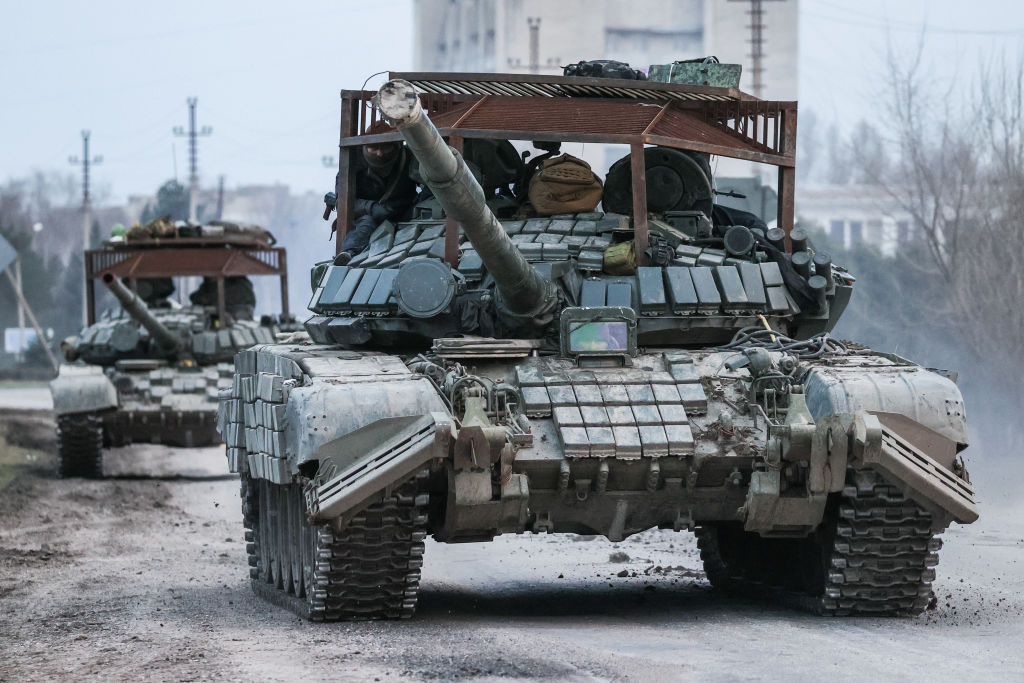
From the battlefield in Ukraine, to the streets of Moscow and St. Petersburg, to the capital cities in countries around the world, Russia was met with more resistance on Thursday than President Vladimir Putin probably imagined. It was still likely nowhere near enough to knock the invasion off course.
The United Kingdom’s Defense Ministry provided an intelligence update this morning at approximately 3 a.m. Ukraine time, concluding that, due to “fierce resistance” from Ukrainian forces across the country, “it is unlikely that Russia has achieved its planned Day 1 military objectives.”
All of the “fog of war” caveats we outlined yesterday still apply—we’ll undoubtedly know much more about what happened yesterday a week from now than we do today—but reports on the ground indicated that, in some parts of the country, the underdogs put up a much tougher fight than many expected. Ukrainian President Volodymyr Zelensky, in an address delivered Thursday evening, claimed his country’s forces were holding back Russian advances from the north in the Chernihiv region and that they had beat back a Russian effort to take control of the Gostomel airport near Kyiv. Though Russia hasn’t confirmed—and likely wouldn’t—Ukraine’s Defense Ministry claimed Friday morning its enemy had already lost about 30 tanks, 130 armored vehicles, seven aircraft, six helicopters, and 800 soldiers in the fighting (the UK pegs Russia’s personnel losses at about 450). Russia’s Defense Ministry responded a few hours later, saying it had disabled 118 Ukrainian military facilities, shot down five jets and one helicopter, destroyed 18 tanks, and seized control of the Chernobyl Nuclear Plant.
Zelensky ordered a general mobilization yesterday preventing men between the ages of 18 and 60 from leaving the country, and Ukraine’s Armed Forces announced yesterday they had received “many inquiries” from citizens about how to enlist. There was no shortage of bravery on display.
One Ukrainian woman, allegedly in the southern Henychesk region, filmed herself walking up to a Russian soldier, asking him “what the f---” he’s doing in her city, placing a “curse” on him, and demanding he put sunflower seeds in his pockets so “at least” flowers will grow when he’s killed. Zelensky confirmed that all the Ukrainian border guards stationed on Snake Island in the Black Sea died Thursday after refusing to surrender. According to an alleged recording of the incident, a Russian warship announced itself and demanded the guards surrender “to avoid bloodshed.” The Ukrainians, after conferring among themselves for a few seconds, got on the radio: “Russian warship, go f--- yourself!” The bombing commenced shortly thereafter.
But Ukrainian fortitude will likely only delay the inevitable, not forestall it. Rob Lee—a Ph.D. candidate researching Russian defense policy at King’s College in London—saw the Gostomel airport, for example, as a luxury for the Russians, not a necessity. “If it had succeeded, it would have allowed Russian forces to move into Kyiv more rapidly before significant resistance could be organized in the capitol,” he said yesterday. “Perhaps Russia thought that if it moved in fast enough, Ukraine would not be able to mount an effective resistance. But this was not Russia’s only option for surrounding or seizing Kyiv. It just delayed the operation while tank and motorized rifle units continue their advance.”
Sure enough, Russian forces began closing in on Kyiv early Friday morning, after taking control of the nearby Chernobyl nuclear plant and reportedly holding staff there hostage. U.S. Defense Department officials told lawmakers Thursday night the Russian army was just 20 miles from Ukraine’s capital city, and numerous explosions were heard in the city overnight. Anton Gerashchenko, a Ukrainian Internal Affairs Ministry official, attributed the blasts to Russian cruise or ballistic missiles. Something large appeared to have been shot down over Kyiv, but there were conflicting reports as to whether it was a Ukrainian or a Russian plane.
“Horrific Russian rocket strikes on Kyiv,” Foreign Affairs Minister Dmytro Kuleba tweeted Friday morning. “Last time our capital experienced anything like this was in 1941 when it was attacked by Nazi Germany. Ukraine defeated that evil and will defeat this one.”
Kuleba’s optimism is admirable, but it’s also likely misplaced. Several hours after that tweet, the Ukraine’s Defense Ministry said that Russians had reached the city, and called on Ukrainian citizens to prepare their own Molotov cocktails. U.S. Defense Secretary Lloyd Austin told lawmakers yesterday Ukraine had only seen the “tip of the spear,” with the “vast majority” of Russian troops not yet in Ukraine. Gerashchenko believes today will be the “hardest” day of the invasion, as Russia plans to roll tanks into Kyiv from Ivankiv and Chernihiv.
“Enemy sabotage groups have entered Kyiv,” Zelensky told citizens this morning, dispelling rumors he had abandoned the city and promising he’d stay with his people. Gunshots were reportedly heard in the government quarter. “According to our information, the enemy marked me as the number one target. My family is the number two target. They want to destroy Ukraine politically by destroying the Head of State.”
As Charlotte noted in a piece for the site a few weeks ago, the Kremlin has been disseminating propaganda for months that sought to justify an invasion of Ukraine to a domestic audience by falsely accusing its leaders of working with the West to commit genocide and plot attacks on the Russian people. If Thursday was any indication, large swaths of the Russian public aren’t buying it.
As reports of what Putin had done began to trickle out, Max Seddon, the Financial Times’ Moscow bureau chief, began compiling a list of notable Russian defections as prominent actors, television hosts, pop stars, rappers, and athletes began speaking out against the war—without mentioning Putin by name. “Today something happened that could and should never have happened,” one post read. “History will judge everything one day. Now I want to beg you to stop military action and sit down to negotiate.” Within hours, a historic Moscow theater was “imploring” its actors from commenting on the “military actions” in Ukraine. “According to information received from the Department of Culture, any negative comments will be regarded as treason.”
Russian opposition leader Alexei Navalny—poisoned in 2020 and sentenced to jail on bogus charges in 2021—voiced his criticism of the incursion during his trial, which was caught on video. “This war between Russia and Ukraine was unleashed to cover up the theft from Russian citizens and divert their attention from problems that exist inside the country,” he said.
Despite incredibly strict laws against public protest—and an explicit warning from the Interior Ministry yesterday—thousands upon thousands of Russians gathered in cities across the country to voice their opposition to Putin’s war effort. The protesters marched through Moscow and St. Petersburg, among other places, holding signs declaring “I’m ashamed to be Russian,” “return the forces home,” and “f--- war.” Police cracked down hard, according to human rights group OVD Info, arresting at least 1,815 people—often violently.
If history is any guide, these protests—spurred by moral opposition to war—could be sustained by worsening economic conditions within Russia. The country’s top stock market index closed down 33.3 percent yesterday, and the ruble sank to a record low as countries around the world announced historic sanctions that will undoubtedly squeeze Russia’s economy further and worsen Russians’ quality of life. “Putin is the aggressor. Putin chose this war,” President Biden told reporters yesterday. “And now he and his country will bear the consequences.”
Biden’s remarks Thursday came after he spoke with his fellow G7 leaders, claiming to have reached “full and total” agreement with the group. “We will limit Russia’s ability to do business in dollars, euros, pounds, and yen,” he said. “We are going to stunt the ability to finance and grow the Russian military. … And we’re going to impair their ability to compete in a high-tech 21st century economy.”
Building on the “first tranche” of penalties laid out earlier this week, Biden announced yesterday his administration was slapping sanctions on five more Russian banks—including the country’s two largest, Sberbank and VTB Bank—as well as 10 additional Russian oligarchs. About two dozen Belarusian entities and individuals will be punished in the new package for their participation in Russia’s aggression, and the administration coordinated with the European Union, United Kingdom, Japan, Canada, and other countries to develop a system of export controls aimed at blocking Russia’s ability to get its hands on sensitive software and technology used for military and defense purposes.
“Some of the most powerful impacts of our actions will come over time,” Biden said. “[We will] squeeze Russia’s access to finance and technology for strategic sectors of its economy and degrade its industrial capacity for years to come.”
Some—including Ukrainian leaders—wanted more. “I will not be diplomatic on this,” Kuleba tweeted yesterday. “Everyone who now doubts whether Russia should be banned from SWIFT has to understand that the blood of innocent Ukrainian men, women and children will be on their hands too. BAN RUSSIA FROM SWIFT.” Asked why the United States and its allies didn’t move to cut Russia from the global financial messaging system, Biden said the U.S. was open to it, but “that’s not the position that the rest of Europe wishes to take.” German Chancellor Olaf Scholz indicated yesterday he was against the move.
“The sanctions we’ve imposed exceed SWIFT,” Biden claimed, noting additional penalties remain on the table. “The sanctions we imposed exceed anything that’s ever been done. … They are profound sanctions. Let’s have a conversation in another month or so to see if they’re working.”
In one sense, he’s right—the United States has never before coordinated such sweeping penalties on a country as large as Russia. But the Biden administration has for months floated the possibility of even harsher sanctions—going after Putin himself, targeting Russia’s energy exports—and if not now, when?
“My advice to the president, both publicly and privately, is ratchet the sanctions all the way up as far as you can,” Sen. Minority Leader Mitch McConnell said Thursday. “We need to do everything we can to make this Russian incursion painful on the Russians who are engaged in it. I’m hopeful that’s the path the president will take.”
Worth Your Time
In a piece for The Economist, Dmitri Alperovitch—whose name TMD readers should recognize—tries to explain why, in addition to a divided Europe, Biden has kept some of the most severe sanctions options in his back pocket. “If America and its allies stay the course on economic sanctions, Russia could further escalate the conflict in other ways. Carrying out cyber-attacks against American and European financial institutions and energy infrastructure is one. Having already exhausted the power of economic sanctions, America and its European allies would have few choices other than to respond to these attacks with offensive cyber-strikes of their own,” he writes. “The purpose of carefully examining these potential post-invasion scenarios is not to argue that America and its allies should impose no costs on Russia for an invasion. Rather it is to drive home the point that these countries, in implementing an appropriate sanctions package, will need to be extremely mindful to avoid triggering a situation of uncontrolled escalation with a major nuclear power—and one that also happens to be a global supplier of critical materials. There is no doubt that Russia should pay a significant price for invading Ukraine, but immediately slapping Russia with the full range of economic penalties risks leading to a spiraling situation that could precipitate significant economic blowback in America and Europe.”
Anna Myroniuk, a Ukrainian journalist at the Kyiv Independent, recounted her family’s experience with the Russia-Ukraine conflict for the Washington Post. “I called my mother to make sure she finds a safe spot—but she has experience. She was forced to flee our home in Donetsk for Kyiv in the autumn of 2014, after Russia unleashed war there,” she writes. “My aunt called from Donetsk, crying: ‘You prayed for me then, now I am praying for you now.’ A call from my father followed. ‘I hope they won’t conscript me into the army,’ he told me. He is an engineer. He stayed in Donetsk after the war began—he supported Russia and its separatist ideas back then. We did not speak for a couple of years: My dad disagreed with my front-line reporting, and I did not take it well. … He does not support Russia anymore. It took him eight years to figure things out. I can’t really blame him. Russia’s propaganda machinery persuaded my father and millions of others to believe what Russian President Vladimir Putin wanted them to believe: that people in the Donbas are Russian, and the region belongs to Russia.”
Yascha Mounk laments the weakening of democratic norms across the globe, and warns about what that means for the world’s dictators—and would-be dictators. “The world’s dictators are taking off their masks. Autocratic leaders from Myanmar to Nicaragua no longer feel constrained by the need to maintain some semblance of democratic legitimacy or appease the State Department,” he writes in The Atlantic. “In the immediate post–Cold War period, even dictators felt the need to worship at the altar of democracy. Political leaders routinely went to great lengths to maintain the illusion of enjoying democratic legitimacy. Though these professions of democratic faith were never sincere, they did create an incentive for authoritarian regimes not to oppress opposition activists or ordinary citizens in the most overt and brutal ways. But that’s now changing.”
Presented Without Comment
Also Presented Without Comment
Also Also Presented Without Comment
Toeing the Company Line
In this week’s Stirewaltisms (🔒), Chris focuses on how Russia’s invasion of Ukraine will likely play with American voters domestically. “Voters very much care about any consequences of international affairs, even if they shrug at the underlying cause.,” he writes. “There’s an increasing likelihood that Russia’s invasion of Ukraine will be a hinge issue for the November elections. We don’t know in which direction because the range of potential outcomes is just far too wide.”
Katherine Mangu-Ward, editor in chief of Reason, joined Jonah on The Remnant yesterday for a conversation about pluralism, power worship, and faith in authority. Can we avoid a “squishy apocalypse?” Is hypocrisy really a problem? Why can’t the government love you? And would the United States be a better place if dog catchers were defunded?
Thursday’s episode of Advisory Opinions was taped live at Yale University. David and Sarah discuss oral argument in a Supreme Court case about states’ legal rights vis-a-vis the federal government, public accommodation law, and a redistricting lawsuit in Arkansas. Plus: Some heated Q&A with the student audience.
On the site today, Charlotte reports on stronger actions the Biden administration could take against Russia, Michael has a brief explainer on SWIFT, and Andrew and Khaya report on Mike Lindell’s de-emphasized presence at CPAC.
Let Us Know
Being an avid news consumer very often means learning—and getting upset—about horrible tragedies over which you have no control. Why do you think it’s still important to keep apprised of global events, even if the information gleaned doesn’t necessarily change your day-to-day behavior?
Reporting by Declan Garvey (@declanpgarvey), Charlotte Lawson (@lawsonreports), and Steve Hayes (@stephenfhayes).
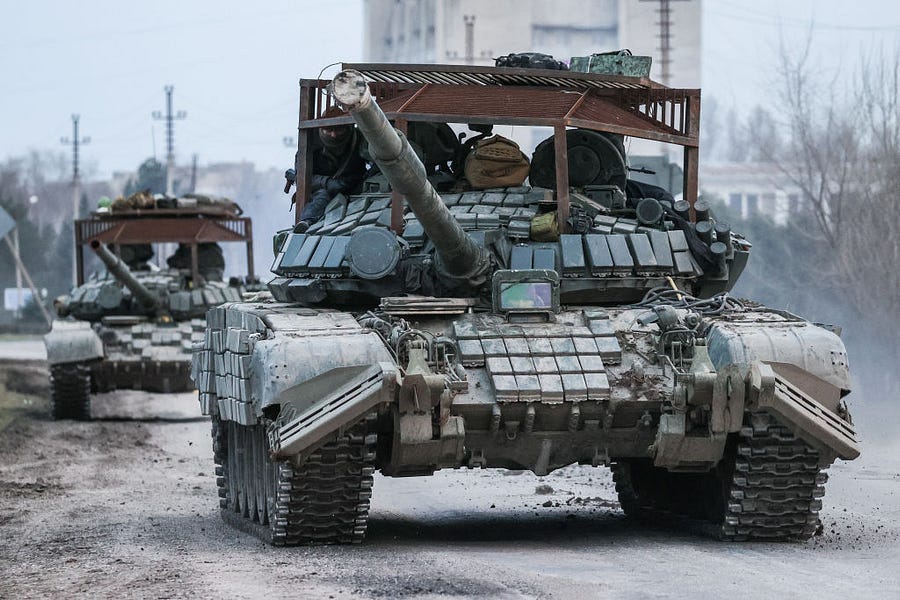


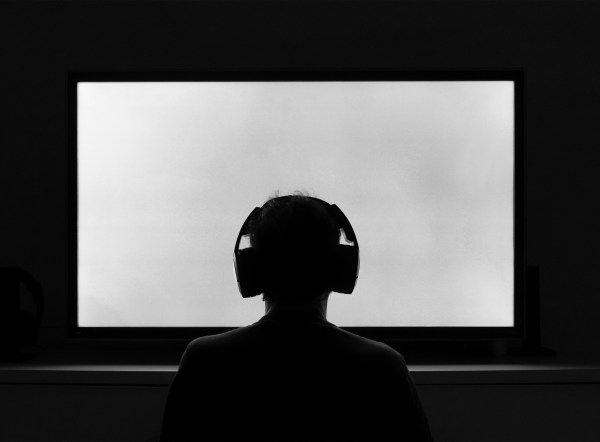
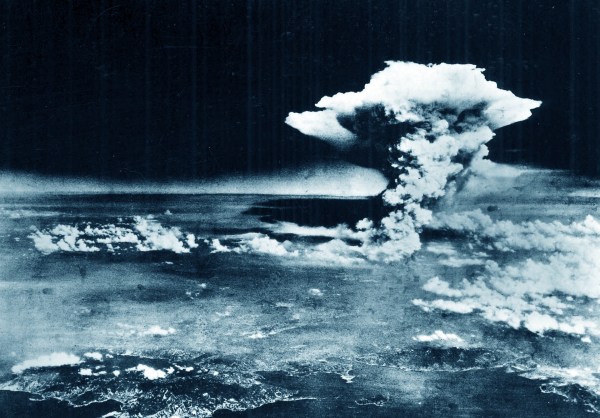
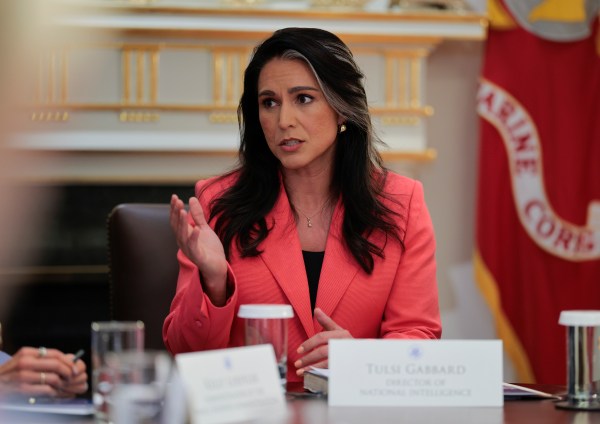
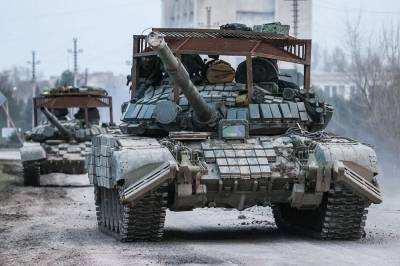
Please note that we at The Dispatch hold ourselves, our work, and our commenters to a higher standard than other places on the internet. We welcome comments that foster genuine debate or discussion—including comments critical of us or our work—but responses that include ad hominem attacks on fellow Dispatch members or are intended to stoke fear and anger may be moderated.
With your membership, you only have the ability to comment on The Morning Dispatch articles. Consider upgrading to join the conversation everywhere.